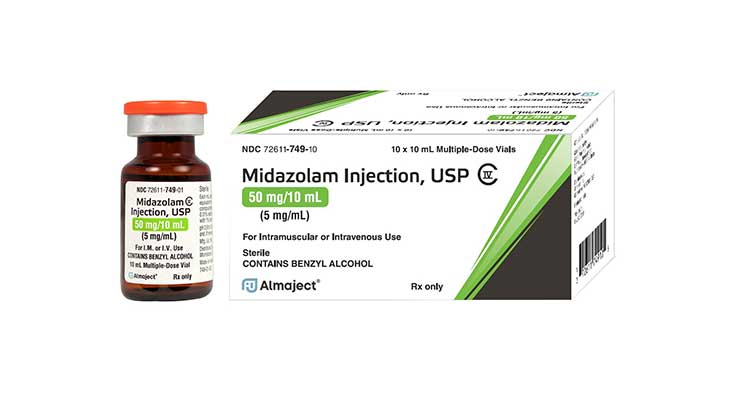Midazolam (Versed) Addiction | Abuse, Effects, Overdose, & Treatment

Medically Reviewed By: Manish Mishra, MBBS
Midazolam (brand name Versed) is a strong benzodiazepine used by Ohio healthcare providers for a number of approved medical uses. Like other benzos, however, midazolam is sometimes abused, leading to long-term physical and mental health risks like dependence, withdrawal, and addiction.

Midazolam (Versed) is a fast-acting benzodiazepine. Like other benzos, midazolam is valued for its sedative, muscle relaxant, and anxiolytic properties, effects that stem from midazolam’s ability to increase GABA neurotransmitter activity in the central nervous system.
In the medical field, midazolam can be given in a variety of forms, and is used for:
- anesthesia
- procedural sedation
- treating prolonged seizures
- management of acute agitation
- palliative (end-of-life) care
Midazolam is considered an essential medicine by the World Health Organization.
Midazolam Abuse
In the United States and Ohio, midazolam is classified as a Schedule IV controlled substance with a comparatively low but still significant potential for abuse and addiction. In all doses and formulations, it is available strictly as a prescription drug.
Midazolam can be abused to self-medicate against insomnia or anxiety, or to trigger a relaxed euphoria similar to alcohol intoxication. This is sometimes intensified by combining midazolam and other substances of abuse, despite this increasing the drug’s risks.
While midazolam abuse doesn’t necessarily indicate drug addiction, regular abuse of midazolam to get high can lead to a pattern of compulsive use, severe physical dependence, and other physical and behavioral changes that signal the development of drug addiction.
Effects Of Midazolam Addiction
Midazolam and other benzodiazepine drugs are not recommended for long-term use due to a high risk of adverse effects related to one’s physical and mental health. Specific long-term effects of midazolam addiction may include:
- anorexia
- insomnia
- increased anxiety
- muscle tremors
- headaches
- problems with memory
- problems with thinking and making decisions
- increased risk of suicide
Prolonged use is also known to promote the development of physical dependence towards midazolam, and abusing the drug in higher doses for any reason can greatly accelerate this process as well as these other long-term concerns.
Side Effects Of Midazolam
Use of midazolam may cause nausea, vomiting, dizziness, and sleepiness. If used as prescribed, these side effects may improve as your body adapts to the drug.
Other serious adverse reactions, including allergic reactions and paradoxical reactions, may also occur and should be referred to a healthcare provider.
Midazolam Overdose
If midazolam is used in high doses or mixed with other drugs (particularly other central nervous system depressants like alcohol, opioids, and muscle relaxants) the effects of the drug will increase and influence the body’s vital functions, including a person’s breathing.
This condition, known as respiratory depression, can be life-threatening to the point that intravenous midazolam is sometimes used by states for lethal injection in combination with other drugs.
Signs and symptoms of a midazolam overdose can include:
- impaired coordination, balance, and reflexes
- weakness
- dizziness
- problems with speaking and slurred speech
- involuntary eye movements
- severe drowsiness
- mental impairment
- low blood pressure
- gasping, gurgling, and other evidence of breathing problems
- coma
If you suspect a drug overdose has occurred, immediately call 911 and provide first aid to the victim until first responders arrive.
Other Midazolam Precautions
In addition to the risks of dependence, addiction, adverse reactions, overdose, and dangerous interactions with other CNS depressants, there are a number of additional precautions for midazolam use:
- precautions related to pre-existing conditions such as kidney or liver disease, breathing problems including sleep apnea, heart disease, narrow-angle glaucoma, and substance use disorder
- risks related to use in pediatric patients and the elderly
- risks related to pregnancy and breastfeeding
- other potential supplement and drug interactions, including known reactions with erythromycin, delavirdine, HIV protease inhibitors, lonafarnib, and ritonavir
Midazolam Addiction Treatment
Midazolam addiction is a treatable behavioral health condition.
The recovery process may begin with replacement therapy, tapering, or participation in a medical detoxification program designed to ease you through the withdrawal process safely and comfortably, before you move on to other treatment stages.
Other evidence-based addiction treatment options include:
- individual and group counseling
- cognitive behavioral therapy
- dual diagnosis care to address mental health issues
- participation in a peer support group
- long-term aftercare support
Our healthcare professionals treat benzodiazepine addiction on an inpatient basis with the above tools and more. To find out if our inpatient facility will work for you or your loved one, please contact Ohio Recovery Center today.
- Australian Prescriber — Management of benzodiazepine misuse and dependence https://www.ncbi.nlm.nih.gov/pmc/articles/PMC4657308/
- Food and Drug Administration (FDA) — MIDAZOLAM INJECTION HIGHLIGHTS OF PRESCRIBING INFORMATION https://www.accessdata.fda.gov/drugsatfda_docs/label/2022/216359s000lbl.pdf
- National Library of Medicine: StatPearls — Benzodiazepine Toxicity https://www.ncbi.nlm.nih.gov/books/NBK482238/

